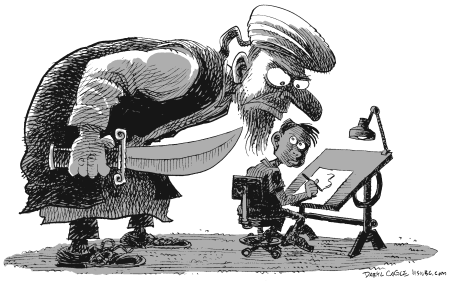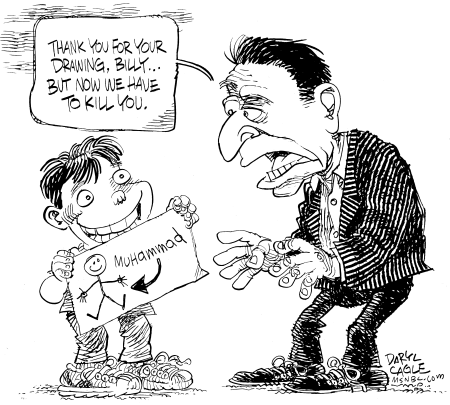
Since the worldwide furor began over the Danish caricatures of Muhammad, the talk among political cartoonists has been about new and unwelcome attention that the fuss has brought to their profession. Editors now view editorial cartoonists as potential problems and gossip is circulating among American cartoonists about their cartoons that are being killed by timid editors and publishers who would have printed the same cartoons a couple of months ago.
I asked a number of the world’s top, syndicated political cartoonists what they think about the ‘toon turmoil and how they see it affecting political cartoonists.
Bob Englehart, The Hartford Courant, Connecticut:
“European newspaper cartoonists have always enjoyed more freedom of expression than we cartoonists in America. All you have to do is check them out on the Internet, and that’s the real chill, the fatal chill. The newspaper business in America is caught in a downward spiral of declining circulation. The cartoon controversy shows why. Most all American papers declined to run the Danish cartoons, thus again proving that newspapers are becoming irrelevant to the news/information process. You, the curious informed public, need to have a computer and Internet service to learn what all the fuss is about. … Editors have decided for you that you can’t handle it. … Young people see right through this. They’ll look at the cartoons on the Internet (as I had to do) and make up their own minds, without the help of newspapers.”
Sandy Huffaker, Nationally Syndicated:
”When a chain buys a newspaper, that paper loses courage. The money guys take over for the journalists, leading to the firing of reporters, investigative reporters and cartoonists – those people who might upset advertisers. It seems like one letter-to-the-editor can cow an editor already afraid for his job. No better example of this is the Muhammad cartoons. Only a handful of our papers had the guts to run them, so no one had any idea how offensive they were or weren’t (they were quite tame). I never thought I’d see the day that France, who had a number of papers run the cartoons, had more courage than we did. It is a sad day for democracy.”
Mike Lester, The Rome News-Tribune, Georgia:
”Methinks the temptation for timidity in the opinions of editors and cartoonists has never seen greater justification. For cartoonists, the previous desire to appear in major papers and newsstand glossies seems to have been replaced with the desire to maintain their current height. I’m not sure who the last brave editor will be, but he/she’s out there. I once drew a cartoon of Jesus turning regular into decaf and was deluged with mail from Christians requesting t-shirt reprints. It would appear that, even though the West has been watching ‘Skating with Celebrities’ and smoking Sudafed we’ve somehow developed a sense of irony leaving the Dark Aged Islamo-fascists still working on indoor plumbing and a sense of humor.”
Rainer Hachfeld, Neues Deutschland, Germany:
“Editors are and were always timid, particularly in the USA. Nothing will change in the behavior of editors. On the other hand, I hate the ridiculous self-pity of cartoonists which is shown in many cartoons about the so-called Muhammad cartoon controversy.”
Monte Wolverton, Nationally Syndicated:
”It’s understandable that editors wish to avoid offending readers and advertisers. At a time when economic safety nets are unraveling, what editor — or cartoonist in their right mind — wants to endanger their career, mortgage, retirement, savings and health insurance, much less provoke riots and evoke death-fatwas? The recent unrest will only reinforce that cautious mindset. But public discourse is not for the cautious, faint-hearted or easily offended. It is best served when issues are confronted boldly and head-on. Cartoonists facilitate that process by offering provocative metaphors to prime the pump of productive argument. Reasonable people understand how this works, but extremists and religious fundamentalists don’t.”
Yaakov Kirschen, The Jerusalem Post, Israel:
“Timid editors do indeed avoid ‘hard-hitting’ cartoons. Timid editors are also partially responsible for falling newspaper sales, because when newspapers choose to be ‘safe’ rather than exciting, provocative and thought-provoking they lose their appeal. And nothing is more exciting, provocative, and thought-provoking than a good political cartoon.”
Pat Bagley, The Salt Lake Tribune, Utah:
“The Muhammad brouhaha has probably strengthened my hand when it comes to arguing for printing a cartoon that the editors might find a little too edgy, especially those dealing with religion. The episode has opened the door on why religion is somehow exempt from criticism. Wasn’t that the whole point of The Enlightenment; that folks could speak back to religious authority?”
Mike Lane, Baltimore, Nationally Syndicated:
“Newspaper people I’ve known, editors included, were generally divided unevenly into two groups: pro and anti-cartoon. So why should we expect editors to even consider (printing) foreign cartoons of an inflammatory nature when many could not care less about comparatively benign, domestic cartoons, is a mystery to me. And if the Muslims are going to get worked up over cartoons of a guy who’s been dead for 1500 years when we’ve been drawing images of Jesus who preceded Muhammad by 600 or so years, I say, OK, it’s your way, not mine. So let’s have a separation of church/temple/mosque and the Fourth Estate. If we’re going to get exercised about what pictures our free press doesn’t print, I say it be over the photos of our dead and maimed young people returning from Iraq.”
Petar Pismetrovic, Kleine Zeitung, Austria:
“I have no idea why anyone needed such cartoons. I think the goal of cartoons is not to insult but to criticize, ape or comment on politics, society, etc. As if there weren’t enough sinners walking the earth (politicians, military leaders, etc.) that saints and religious idols needed to be attacked in cartoons. My only wish is that cartoons stop being misused by extremist organizations and elements, and that they are appreciated for what they should be: critical comment and a good joke.”
Olle Johansson, Norra Vasterbotten, Sweden:
“The upside to the incident with the Danish Muhammad cartoons is that I believe many editors will open their eyes to the immense power that is within the political cartoon. The downside is that at the same time many of them may unfortunately choose a more careful approach especially when it comes to international cartoons concerning people and/or cultures they don’t fully understand. But I choose to believe that this will strengthen the cartoon as journalistic instrument. And it has certainly brought back the nerve to this form of art.”
Riber Hansson, Svenska Dagbladet, Sweden:
”In Swedish children’s books you can find ‘the world’s strongest girl,’ Pippi Longstocking. She used to say: ‘If you are very, very strong you have to be very, very kind.’ A political cartoonist, supported by (a free press), will be very, very strong. You can immediately see the dilemma for an artist trying to follow Pippi’s advice; the political satirist’s basic tool is not exactly kindness … My personal policy as an editorial cartoonist is to (strike only at) power. Belief belongs to the private sphere, and I try to avoid religious subjects for that reason. I can’t guess what my reaction would have been if my courage as a cartoonist had been challenged, as it was with the Danish cartoonists by editors asking (them to) dare draw the Prophet Mohammad. Self-censorship is an emotive and provoking term for a political cartoonist, maybe for all artists. I hope I would have had the courage to say “no.” The political cartoon needs to be free, without any editorial finger over the cartoonists shoulder, pointing out the subject (matter).”
Patrick Chappatte, The International Herald-Tribune, Geneva:
“I’m bothered by the fact that in the Danish approach, Muhammad was not merely a cartoon character, but he was the very purpose of the cartoons. The idea was to represent him because he’s a forbidden figure. On the other side, those images have been misused by extremists to stir up anger and misunderstanding (by) the same extremists who take delight in anti-Semitic caricatures. The aim of political cartooning is not – should not be – in itself to hurt; it is to make a point. It can be a political, or a moral point. It can be funny or serious. In the process, it can hurt your feelings, your political beliefs or your religious principles – but this is a collateral damage. Muhammad is not a subject. Violent radical Islamists are a subject. Humiliation of the Palestinian people is a subject”.
Stephane Peray, The Nation, Thailand:
”I see several reactions in the newspapers that I regularly work with. … Emotions are running high and you have the feeling that the readers are not even taking time to understand the cartoon that they have already burst into some kind of irrational anger ( or is it fear? ) … So in this kind of atmosphere, I can understand editors not taking risks … the biggest hypocrisy is to keep defending ‘Freedom of Press’ like it was the latest highest value the West has invented when in reality – the Power of Money is higher than the ‘Freedom of the Press,’ so how can we really defend it as ‘value?’”
Vince O’Farrell, The Illawarra Mercury, Australia:
“… to deliberately antagonize the Muslim community especially in the context of broader world events was an irresponsible exercise in abuse of freedom of the press. The response from the rampaging fanatical zealots was just as stupid and pathetic. Who’d want to be the head of the Islamic Public Relations Bureau? Now there’s a 24/7 job. In almost 30 years of newspaper cartooning I could probably count the number of times I’ve had a definite ‘NO’ from an editor to a cartoon on one hand. … As newspaper publishing the world over is increasingly driven by the bottom line, cartoonists in general will have to expect that those ‘hard-hitting’ cartoons, especially the ones that go after the corporate juggernauts etc. will more and more be assigned to the waste paper or ‘too hard basket.’”
Note to editors:
This column is a great opportunity to show a round-up of cartoons about the Muhammad cartoons, with comments by each of the cartoonists. Cartoons by all of the cartoonists in this column are available on our download site at caglecartoons.com or you can contact cartoonist Brian Fairrington at [email protected] or (800) 983 7054 and Brian will help you find appropriate cartoons and e-mail the cartoons to you.

























